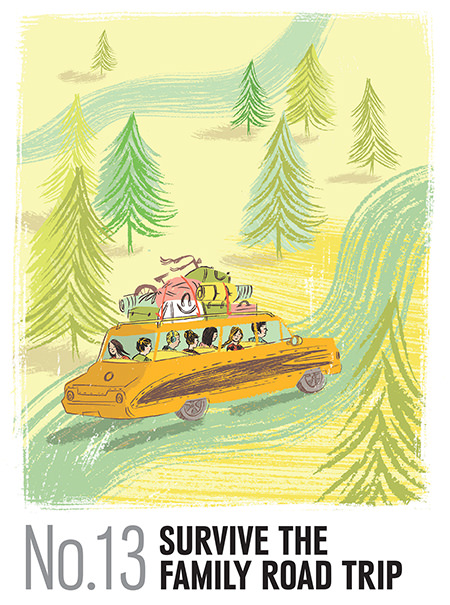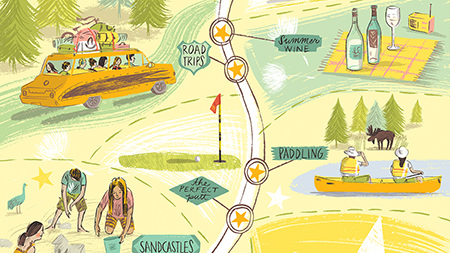By Curtis Gillespie, '85 BA, author of Almost There, The Family Vacation Then and Now and editor of award-winning magazine Eighteen Bridges; illustrations by Katy Dockrill

I recently wrote a book titled Almost There, in which I combined a history of the family vacation with the history of my family vacations. The central narrative event of the book was a road trip my family took in 1974, in which eight of us took a station wagon from Calgary to Mexico City and back in the dead of winter. You'll have to read the book to find out what happens. (Though I'm happy to report that eight departed and eight returned. The same eight.)
Researching and writing the book was enjoyable, but promoting the book was enlightening. Anecdotal evidence gathered during my readings and book events revealed that, apparently, 100 per cent of Canadians have memories of a childhood family road trip. Comparing data sets only muddies the waters, given that the statistics from the period reveal that Canadian family car ownership was not 100 per cent. This can only mean - applying rigorous scientific methodology - that there were a lot of families crammed into those cars.
Never mind.
Taking the response to my book into account, it would appear that the family vacation road trip has not yet gone the way of various other obsolete socio-cultural artifacts, such as Blockbuster, trans fat and teenagers talking face to face. But why has the road trip persisted? There are various theories to explain its resilience. One posits that it reflects a deep nomadic genetic marker; as prehistoric hominids, we had no choice but to move, to trek, to explore. Another theory is that the road trip intersects conveniently with a predominantly middle-class, family-oriented, automobile-obsessed westernized culture - it's affordable, knowable and yet individual. A third theory, the one to which I subscribe, holds that parenting is an inherently bonkers pursuit anyway so why not double down?
Given that it has survived and looks set to remain a vacation staple, I have provided a list of tips that will, I hope, assist you in surviving, and possibly even enjoying, a family road trip.
Rule 1: Vomit
It's not a family road trip unless someone throws up in the car. To avoid the escalation of tension, it's best if someone throws up as soon as possible upon departure. Avoid all methods of digital and/or chemical inducement, as these are dangerous and do not count. It also does not count if you throw up while planning the road trip (though this may be a sign you should consider a different style of family vacation … or a different family).
Rule 2: Chill
Embrace as a family the quieter moments and the inevitable bit of boredom. Take care, however, to avoid using the actual word "boredom" in front of the kids, which is the equivalent of waving a red cape in front of a bull. Instead, call it "down time." Call it "recharging the batteries." Call it "chilling," "relaxing" or, to invoke eye-rolls, "chillaxin'." Call it, "If you mob don't give me 10 minutes of peace and quiet this afternoon, I'm going to jump into the deep end of the motel pool even though there's no water in it." Whatever you call it, remember that life is about contrast and if everything were perfect, nothing would be perfect.
Rule 3: Diversity (or Not)
Activities. Motels and hotels. Pools. Food. Especially food. Diversity is crucial … until it isn't. Care is required, because if you fail to understand why your kids "need" pizza and chicken wings three nights in a row, then you are clearly a bad parent with no insight into your children.
Rule 4: Respect
Allow the kids to share with you what it is they like and dislike. Share with the kids what you like and dislike. And then everyone just put a sock in it and fall in line with what Mom wants.
By strictly following these four rules, you will give yourself a better-than-even chance of returning home as the same single family unit that left two weeks earlier. Fun, excitement, togetherness, adventure, relaxation … sure, anything's possible. But don't worry if you don't hit your marks in one go. The good news is that you can always turn around and try it all over again. That's also the bad news.
